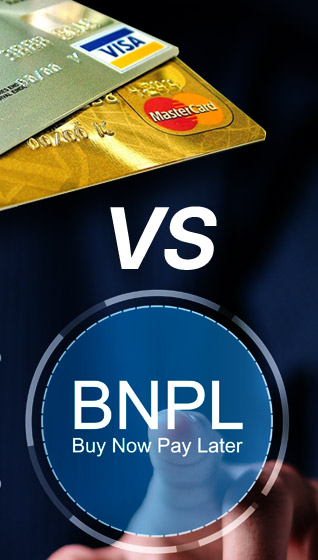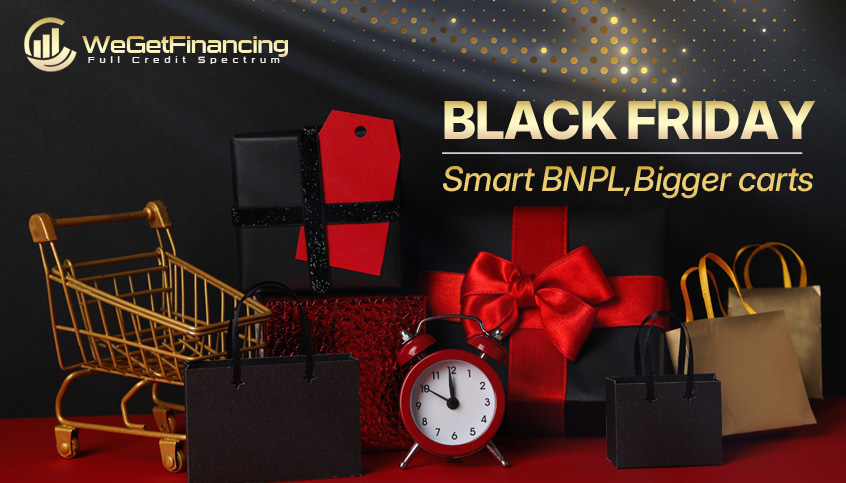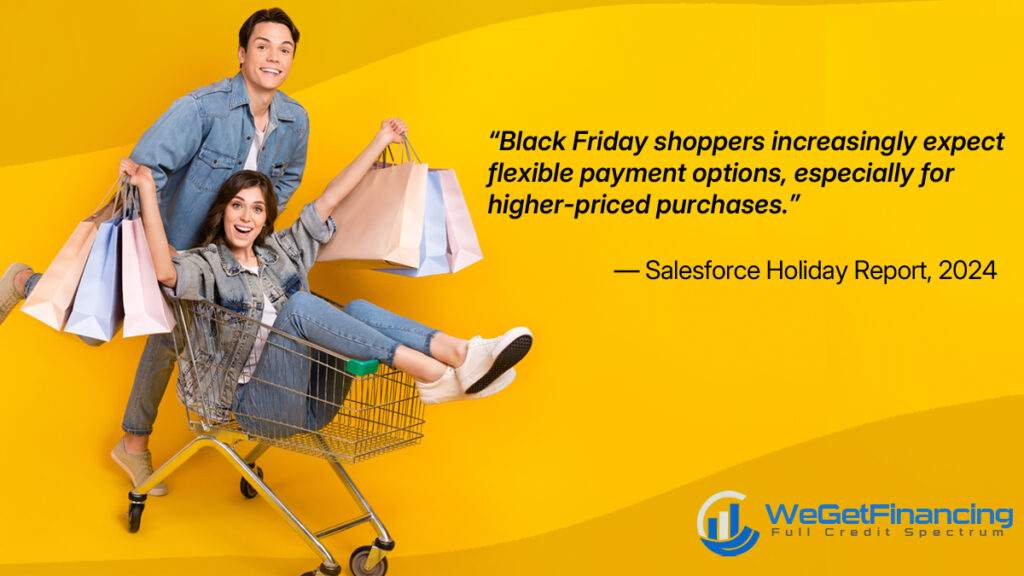No record-breaking Black Friday in 2025 without Smart BNPL.
“ Shoppers who used a BNPL service spent $598 on average on Black Friday, versus $452 among those who didn’t use a deferred-payment method.” — PYMNTS Intelligence survey of U.S. consumers, Nov 2023.
This pattern has continued as BNPL adoption grows. In 2024, U.S. shoppers spent $10.8 billion online on Black Friday alone and $13.3 billion on Cyber Monday — both all-time highs. The upcoming Black Friday and holiday season is shaping up to be another record-breaker.
Overall, U.S. holiday-season e-commerce (Nov 1 – Dec 31) reached $241.4 billion, and analysts expect 2025 to surpass $253 billion, with BNPL volumes up 11% year-over-year (about $20.2 billion vs $18.2 billion in 2024).
So what does this mean for retailers?
It’s no longer just about discounts — shoppers expect flexible payments, faster decisions, and clearer financing options. In the sections below, we break down the numbers, the behaviors, and the BNPL strategies that will shape a successful Black Friday 2025.
Black Friday & Holiday Season in the U.S.: Fast Facts and Industry Breakdown
Here are the core numbers defining Black Friday and holiday spending in 2024–2025.
Key 2024–2025 U.S. retail and BNPL figures at a glance
Black Friday 2024
U.S. Retail Performance

+3.4% YoY,
e-commerce +14.6%
Cyber Week
2024 Snapshot

$314.9 B globally,
$76 B U.S. sales
Peak Shopping
Days 2024

TG $6.1 B, B Friday,
$10.8 B, Cyber M $13.3 B
Holiday 2025
Expect Growth

Online Sales +5.3 %,
BNPL +11 %
BNPL turns peak-season traffic into measurable growth.
Industry spend by category (2024–25 estimates)
These 2024–25 estimates combine data from major retail and e-commerce trackers such as Adobe, Salesforce, and industry-specific reports (Bluehost, Ingrid). They provide an overview of the main U.S. sectors driving holiday and Black Friday spending growth — especially in categories where Buy Now Pay Later adoption is accelerating, such as furniture and home goods and high-performance PCs.
| Sector | 2025 Forecast Spend | YoY Growth |
|---|---|---|
| Electronics | $57.5 B | +4.0% |
| Furniture & Home Goods | $31.1 B | +6.5% |
| Apparel & Fashion | $47.6 B | +4.4% |
| Grocery & Essentials | $23.5 B | +9.3% |
Black Friday itself skews toward fashion (≈ 41%), home & electronics (≈ 17%), and health/beauty (≈ 15%), confirming how essential flexible financing has become across both lifestyle and durable-goods categories.
Shopper Behavior: Why BNPL Spikes on Peak Days
“ Black Friday shoppers increasingly expect flexible payment options, especially for higher-priced purchases.” — Salesforce Holiday Spending Report, 2024
For many retailers, offering smart consumer financing options is now part of their core Black Friday strategy, not just a nice-to-have. Understanding how and why shoppers use BNPL during peak sales events helps retailers tailor their offers, messaging, and payment options for maximum impact.
The psychology behind the spree
Scarcity, countdown timers, and “once-a-year” discounts trigger urgency. BNPL fits this mindset perfectly — it lets shoppers stretch budgets without deferring gratification. For retailers, that psychological comfort translates into larger baskets and lower cart abandonment.
Seasonality and risk
The CFPB reports that BNPL borrowings jump from <$100 M/day off-season to ≈ $150 M/day between Black Friday and Christmas Eve. This proves holiday dependence — and why risk-managed multi-lender solutions matter to keep defaults low while approvals stay high.
This surge demonstrates how holiday shopping drives BNPL usage — and why inclusive, risk-aware BNPL technology is needed to support more shoppers without compromising credit quality. As activity intensifies through the season, compliance and lender transparency also become even more critical — a point reinforced in our recent analysis of BNPL regulation and consumer-protection rules.
Generational patterns
Numbers are clear for younger Americans:
- Gen Z: During the 2024 holidays, 54% used BNPL vs 50% using credit cards (J.D. Power).
- Millennials: Budget-savvy and loyalty-driven; they respond to clear repayment schedules and fee transparency.
This aligns with broader demographic shifts seen across U.S. retail, with Gen Z and Millennials driving the fastest BNPL adoption across all major purchase categories.
Older generations show a different dynamic:
- Gen X: More deliberate buyers — only about one in three use BNPL, yet satisfaction scores are among the strongest when they do.
- Baby Boomers: Still the slowest adopters — roughly 1 in 8 use BNPL, favoring traditional payment methods and familiar financing options.
Messaging and visibility
Financing should be visible early — on the product page and category banners, not only at checkout. And in-store marketing is just as crucial: signage, QR codes on price tags, and trained staff who can explain “buy now, pay later” options boost trust and conversion. Consumer financing is not a last-minute add-on; it’s a key part of the shopping journey.
BNPL & Black Friday: Where the Upside Is
Buy Now Pay Later isn’t just popular during Black Friday—it’s becoming a key driver of higher cart values and stronger overall sales when implemented strategically.
1) BNPL goes mainstream on peak days
With BNPL expected to cross $20 billion for the 2025 season and Cyber Monday alone passing $1 billion in BNPL transactions, the model is no longer a niche add-on but a core payment method. Merchants offering inclusive, multi-lender BNPL see higher approval rates and less checkout friction across credit tiers. These shifts reflect the broader evolution of consumer credit itself, detailed in our 2025 consumer financing outlook.
2) Know your shoppers and tune the pitch
- Gen Z: Highlight instant decisions and mobile-first experience.
- Millennials: Focus on budget control and financial well-being.
For merchants aiming at these cohorts during Black Friday 2025:
Make BNPL financing a visible part of your value proposition — so customers associate flexibility with your brand, not just with the checkout step. This reinforces trust cues, transparent repayment terms, and in-store financing options for groups that prefer more reassurance.

Common Merchant Dilemma:
Will BNPL Cannibalize Credit-Card Sales?
Some retailers worry that offering BNPL could reduce card usage or loyalty-program engagement. Yet rising credit-card debt — now over $1.1 trillion in the U.S. — shows consumers are looking for predictable, interest-free ways to pay.
BNPL doesn’t replace card sales; it expands them.
When used smartly, it boosts confidence, raises average order value, and turns “maybe later” into “buy today.”
3) Big-ticket items drive the biggest gains
Black Friday isn’t just about impulse buys — it’s also when shoppers make planned, high-value purchases. Categories such as electronics, furniture, and PCs dominate the season, and this is where BNPL shines: it lowers hesitation, boosts conversion rates, and lifts average order value.
Offering longer, transparent payment terms on these larger items encourages customers to upgrade instead of compromise, translating directly into higher revenue per sale.
4) Short funnel, full spectrum
As we’ve said many times across this blog, the technological landscape of consumer financing is changing. In 2025, Smart BNPL means :
- Single application and unified checkout funnel — with multi-lender routing for instant approval coverage.
- Flexible terms from short split plans to 24-month installments.
- Unified experience online and in-store.
- Strong fraud controls and real-time risk scoring during holiday surges.
These benefits depend heavily on the underlying lending architecture — whether a retailer uses a single lender or a true multi-lender technology. Our analysis of BNPL gateways vs single-lender models breaks down why coverage and approval rates vary so widely.
5) In-Store BNPL Opportunities
“Online retail sales increased +14.6% on Black Friday, while in-store sales were up a more modest +0.7%,” according to Mastercard SpendingPulse (source investor.mastercard.com, 2024)
Last but not least, online spending surged again in 2024, rising +14.6% year-over-year according to Mastercard SpendingPulse. Yet Adyen’s analysis shows that U.S. shoppers still spent 51% more in-store than online — with in-person transactions six times higher than a normal retail day1. The takeaway is clear: during Black Friday, the real winners are retailers who deliver a seamless omnichannel experience, not those relying on a single sales channel.
Despite that, many stores still lack flexible, easy-to-use financing options at checkout. Embedding BNPL directly at the point of sale — through QR codes, tablets, or Tap-to-Pay integrations — turns that traffic into higher AOV and repeat loyalty.
The goal is to deliver the same seamless financing experience shoppers expect online within the physical store, helping merchants close the gap between browsing and buying (see our Storis integration for BNPL furniture).
Make Black Friday 2025 a BNPL Win
In short, Black Friday 2025 and the holiday season are set to shatter records once again, but success won’t come from discounts alone. It will belong to retailers who offer safe, trustworthy, inclusive financing that helps shoppers buy smarter and spend more comfortably. In a season defined by competition and tighter budgets, Smart BNPL becomes a genuine growth lever, turning holiday traffic into sustainable revenue.
Here are five clear, actionable steps retailers can take to maximize conversions and financing adoption during the Black Friday peak.
Practical Moves for a successful Black Friday 2025
Promote BNPL upfront—online and in-store—to guide shoppers and reveal real buying power.
Keep BNPL terms consistent across ads, checkout, and retargeting to lift ROI and reduce cart drop-offs.
Train your teams to explain BNPL simply. Clear messaging turns flexibility into conversion.
Choose transparent BNPL partners. Clear, honest terms create repeat buyers and loyalty.
Monitor AOV, approvals, and returns — and rely on a BNPL partner that delivers clear, transparent reporting.
Want to see how multi-lender BNPL can increase your holiday conversion rates and average order values?
Contact WeGetFinancing to benchmark your checkout experience before the rush.
The WeGetFinancing Editorial Team
Expert insights on BNPL, consumer financing, and retention strategies.
Notes





